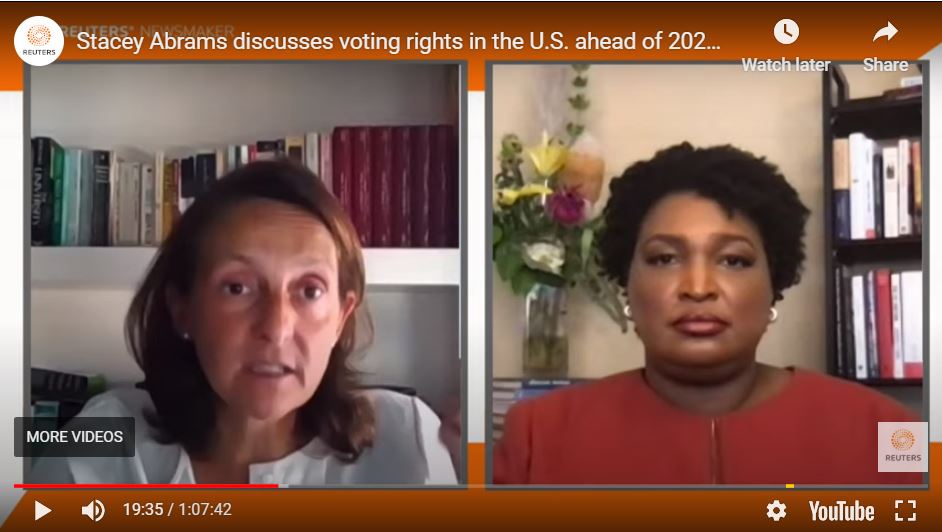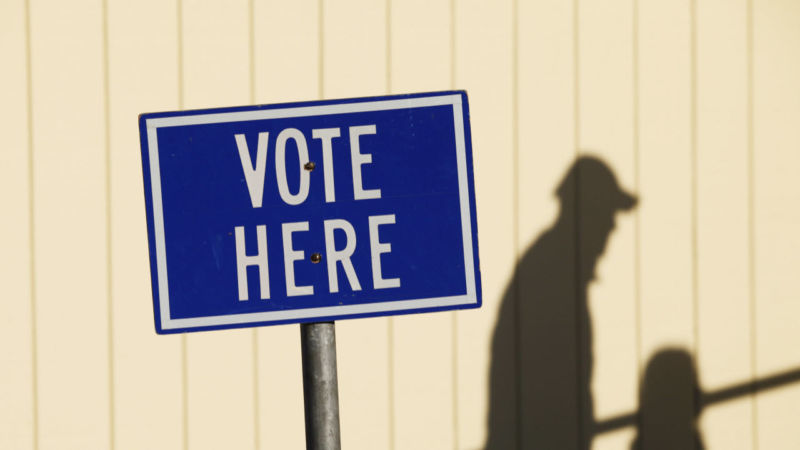Stacey Abrams is on a mission to save American democracy. Her method? Ensuring that every eligible voter in the country has an opportunity to cast their ballot — and have it count.
In a recent Reuters Newsmaker interview with Reuters Global Managing Editor Alessandra Galloni, Abrams — a Democrat and possible candidate for vice president — explained why she thinks American democracy is in peril. “I think the most startling challenge, unfortunately, in a democracy as robust and stable as ours, is the legitimacy of the election,” she lamented.
Abrams cited numerous Republican tactics that she believes are being used to undermine public confidence in the upcoming November presidential election. Among them: refusing to pass the $3 trillion HEROES Act, which includes funding for election reform; hobbling the U.S. Postal Service in the middle of a pandemic; falsely claiming that mail-in ballots are ripe for fraud; shutting down the 2020 Census a month early; and supporting laws that inhibit the right of every eligible American to vote.
Fighting for national election reform
Abrams’ passion is understandable. In 2018, she lost the Georgia gubernatorial election by 55,000 votes to Republican Brian Kemp, who has been accused of using his position as Georgia’s then-Secretary of State to oversee his own election and actively suppress voter turnout, particularly in Black and Latino neighborhoods. Abrams never conceded the election; instead, she started a non-profit, Fair Fight, which filed a lawsuit aimed at reforming Georgia’s electoral process.
Since then, Abrams has gone national with her election-reform efforts, focusing on 18 key states where African-American voter turnout could prove decisive in November, up and down the ballot. National election reform is necessary, she explained, because “the United States is a federalist system. We rely on the federal government to step in and solve a crisis that no one state can solve alone. And when the abdication of responsibility that we’ve seen happen from the Republican-led Senate occurs, then we are watching on a national-level voter suppression that we have unfortunately been aware of at the state-level for the past 20 years.”
A Democratic win in November is essential, Abrams said, because “minority communities are disproportionately affected by the COVID-19 crisis” both physically and economically. Not only are more African-Americans and Latinos contracting COVID-19 and dying, she said, they have also been denied promised federal assistance for their businesses. “When the first round of Paycheck Protection Program (PPP) was issued, only 1% of African American applicants received any resourcing,” Abrams noted. “And we know that around the country, the resources coming from the federal government to support Black businesses has been woefully inadequate.”
Restoring American leadership
Minority communities are not the only constituents Abrams is concerned about. She is also worried that the federal government’s lack of a coordinated response to the coronavirus will continue to erode the financial security of all Americans, throwing millions more into poverty. America’s mismanagement of the pandemic response is also undermining the country’s international standing in the global fight against the disease, she added.
“We have to address the public health crisis that is the pandemic, and that means returning to a global health system,” she said, adding that Democratic presidential candidate Joe Biden helped build just such a system during the Obama administration, but it “was unfortunately dismantled by Donald Trump.”

Restoring American leadership around the world is important too, because a global economic recovery cannot happen without a high degree of international cooperation, Abrams said. “The United States is going to have to be an active participant in how we stabilize the global economy and prepare for the next decade of growth,” she insisted. But, she added, that can’t happen until the U.S. proves it can gain control of the coronavirus.
“Part of the United States’ responsibility is to demonstrate competency at home, so we can have viability in helping to address these challenges worldwide. So far, America is failing that test.”
A free and fair election
Fair Fight is also working to ensure that the November election itself is a fair one, she explained. Aside from working to expand voter access, one of the biggest challenges organizers face is managing expectations about what is likely to happen on Election Day.
“We have to realize that we’re not going to have a decision by 11 p.m. [on Election Day], and it’s not going to happen for a number of reasons,” she said. “First, the sheer volume of people who will be voting by mail is going to preclude the ability to count those ballots and adjudicate the outcome of the election.” She noted that it took 10 days to resolve her own election in Georgia, and a deluge of mail-in ballots has delayed results in the New York primary by more than six weeks.
To avoid a similar calamity on November 3, Abrams advocates implementing the uniform national election rules outlined in the stalled HEROES Act, which the U.S. Senate has yet to approve. The HEROES Act stipulates that every state provide its citizens with at least three voting options: voting by mail, extended in-person early voting, and in-person voting on election day. The $3 trillion bill also provides $3.6 billion in funding to help cash-strapped state governments scale up their election resources.
“My admonition is that we have to approach November 3 with patience,” she said. “We have to do everything we can to certify that the elections are fair and free as possible. But we also have to have patience in determining the outcome.”
Democrats are of course concerned that Republicans will try to exploit inevitable delays to cast doubt on the election. But Abrams said the best defense that Democrats can mount against such tactics is to “overwhelm the polls with our participation.
“Because one of the surest signs of victory will not just be how long it takes [to get election results], but how overwhelming the margin of victory is.”
Given that an over-burdened, under-funded election infrastructure will likely be the cause of those delays, encouraging more people to vote could exacerbate the problem, of course. However, she reminded viewers that voting is ultimately the best remedy Americans have if they believe the current occupant of the White House should be a one-term president. “We are a vulnerable democracy. We cannot take for granted that the populist authoritarian tendencies that we’ve seen from Trump are simply going to go away if he is no longer in office.
“A tin-pot dictatorship can happen in the United States,” Abrams warned. “We have seen other steady democracies fall in recent years, and we cannot believe that the America we love is immune.”







